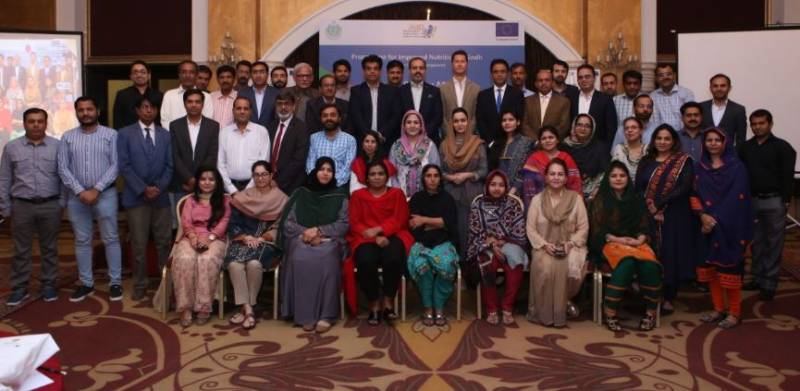Karachi (PR): Deputy Coordinator of Accelerated Action Plan (AAP) Task Force Muhammad Yousuf Shaikh has said that the role of Health Workers (CHWs) is crucial to improve health seeking behavior and compliance to treatment among mothers.
PINS Nutrition Specific Component led by Action Against Hunger (ACF) organized its first annual review meeting on the other day.
Addressing on the occasion, Program Coordinator AAP Health, Dr Sahibjan said that malnutrition is a complex issue and it is the main cause of death and disease in developing countries. She emphasized the importance of behavior change communication activities to improve nutrition, breast-feeding, sanitation and childcare practices. She envisioned that the SBCC toolkit would be instrumental in promoting behaviour change at individual, household and community levels, which is the need of time in Sindh. All government and non-government sectors need to work together to address malnutrition in Sindh.She also thanked the European Union for its generous and ongoing support to the GoS.
Pakistan ranks third among the countries with high rates of stunting in young children. In Sindh, almost 57 percent of children under five are stunted. The Government of Sindh is committed to reducing stunting and addressing malnutrition. The European Union has supported the Government of Sindh by funding and initiating the largest donor funded grant called the programme for Improved Nutrition in Sindh (PINS).
Action Against Hunger has worked in Pakistan for 40 years. Mr. Christopher Aaron Golden, Regional Director Operations of ACF also appreciated the support provided by the European Union as he described achievements of the PINS programme. He highlighted that PINS has contributed to addressing malnutrition in Sindh by provided treatment to 53,010children under 5 years,suffering from severe acute malnutrition (SAM), through 262 out-patient therapeutic (OTP) sites established in eight districts of Sindh. He also shared that 293 of these children had medical complications along with severe acute malnutrition. Children with medical complications were treated at the eight Nutrition Stabilization Centres (NSCs) - one in each of the eight programme districts.
Dr. Ayesha Aziz, Chief of Party PINS thanked all stakeholdersfor their valuable contribution and joining hands to fight against malnutrition in Sindh.


